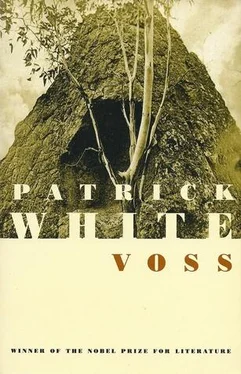‘Now that we are all here, let us sit down at once,’ Mrs Sanderson suggested. ‘I expect you are hungry, Mr Angus.’
‘I am always hungry,’ said the agreeable young man, but somewhat tight-lipped.
For Mrs Sanderson was disposing her guests at the table.
‘And you, Mr Angus there. And Mr Judd.’
Angus was all vagueness and colour as his hand touched the back of the chair. Whereas Mr Judd seemed possessed of a sad irony for some situation that he had experienced before.
Voss realized then that they were about to sit down with the former convict, and that the prospect occupied the young landowner’s mind to the exclusion of all other thought or feeling. The German wondered whether his own crimes, to which he would admit on days of candour, exceeded those that Judd had committed. Here he might possess, he felt, a salve for some future sore. But he quickly threw it away. His own distaste was rising. He did not object to Judd as a convict, but already suspected him as a man.
‘Come, then,’ said Mr Sanderson irritably, ‘is nobody going to sit down?’
Because he was daring them not to, and because of the respect they bore him as an unquestionably superior being, everybody did sit, while saving up their grievances.
Then the girls were bringing a big soup, and thick, homely plates.
‘I understand Mr Judd is a squatter in these parts’ — the German did not quite accuse.
His face professed kindness, but was prepared to examine any visible wounds.
The emancipist barely turned his eyes, and opened his mouth. He expected his host to save him, which Sanderson hastened to do.
‘Mr Judd has taken up a few acres on our boundary,’ he explained. ‘So you see, we are close neighbours. Fortunately for us, as it means we are able to take advantage of his assistance and advice.’
Judd began to eat his soup, which was of a milky, potatoey consistence, speckled with sweet herbs, and eminently soothing. The convict was taking Sanderson’s defence of him for granted, or so it seemed. Some of those present adjusted their opinion of him from that instant, considering that they themselves would have spoken up. But Judd continued to eat his soup. The opinion of others did not affect him any more.
The company enjoyed their dinner. They had a big, crisp, crinkled saddle of baked mutton, and a dish of fresh, scented plums, and conversation, which by degrees, and with the warmth of wine, sounded agreeable to everyone.
The evening progressed. It would not be one in which to discuss matters of importance. This was implicit in the light and temper of it. Mrs Sanderson kept her guests deliberately on the surface, and began to enjoy herself, remembering parties of her girlhood, with music and games. She became quite flushed, and looked frequently at her husband, who was preventing the collision of their friends by his own methods. He had begun to give some account of their existence at Rhine Towers, since they arrived there on bullock wagons, with all their possessions and their white skins, and were at first burnt, then blistered, finally calloused, but above all, grappled for ever to their land by the strong habits of everyday life that they formed upon it. Many simple images were conveyed most vividly to the minds of his audience, there to stay, as he told of prime beasts, a favourite gun, springs of cold water he had found in the hills, or a wild dog he had failed to tame. Once, treading through the bracken, his horse’s hoof had struck against a human skull, probably that of some convict, escaped from the coastal settlements in search of the paradise those unfortunates used to believe existed in the North.
The narrator presented the skull with such detachment that Ralph Angus could almost feel the downy bracken growing through the sockets of his own eyes.
Judd, too, observed the skull, in silence. His silences, Voss could feel at times, were most formidable.
After an interval, when the company was broken into groups in the tattered firelight, or dozed singly and fitfully between the flickering of eyelids, the German approached the convict, who was seated just a little to one side, and resolved to talk to him. Leaning with his forearm against the wall, and crossing his ankles in prim support, always leaning, and yet with a kind of awkward formality, he said:
‘Tell me, Mr Judd, you own this property, and yet see fit to leave it for so long a period as the expedition will require?’
For he would offer the convict a loophole.
‘Yes,’ answered the solid man. ‘I have an able wife, and two boys who were brought up to hardship.’
No shadow of doubt was revealed in this reply.
‘You must feel very strongly on the necessity for such voyages of discovery,’ said Voss, always looking down at Judd.
The explorer recalled finding on his previous journey a mass of limestone, broken by nature into forms that were almost human, and filled with a similar, slow, brooding innocence.
The convict said:
‘I have had some experience of the country to the north-west. As you have been told. And I consider it my duty to offer my services to the Colony on the strength of that experience.’
‘In spite of certain injustices of the Crown?’
The German was honestly interested in such a conundrum of human behaviour. Although an expert in perversity, this had a strangeness that even he did not understand. So he continued to look at the emancipist, as though their positions were reversed, and Judd were the foreigner in that land.
Judd was moving his lips.
‘In spite of — yes, in spite of it,’ he replied, and did not look at Voss.
‘I shall take pleasure in knowing you better in the course of time,’ the German said.
The emancipist made a wry mouth, and sound of regret or doubt, of which Voss, preoccupied with his own deficiencies, remained unaware. Indeed, the pleasure he promised himself in learning to understand Judd did seem illusory, for rock cannot know rock, stone cannot come together with stone, except in conflict. And Voss, it would appear, was in the nature of a second monolith, of more friable stone, of nervous splinters, and dark mineral deposits, the purposes of which were not easily assessed.
Judd excused himself, saying:
‘I am a simple man.’
Which can read: most complex , Voss suspected.
‘But I am pledged to give of my best. If it is only with my hands. You see, I have received no education worth speaking of. I have not read the books. All my gifts are for practical things. Then, too, I have a “bush sense”, it has been proved. So there, sir, are my qualifications in a nutshell. Oh, I forgot to mention endurance. But that goes without saying. I have survived till now.’
All these words were placed upon one another broodily, like stones.
Voss, who was looking down all the time upon the man’s massive, grizzled head, could not feel superior, only uneasy at times. It was necessary for him to enjoy complete freedom, whereas this weight had begun to threaten him. So he was chewing his moustache, nervously, his mouth quite bitter from a determination to resist, his head spinning, as he entered in advance that vast, expectant country, whether of stone deserts, veiled mountains, or voluptuous, fleshy forests. But his. His soul must experience first, as by some spiritual droit de seigneur , the excruciating passage into its interior. Nobody here, he suspected, looking round, had explored his own mind to the extent that would enable him to bear such experience. Except perhaps the convict, whose mind he could not read. The convict had been tempered in hell, and, as he had said, survived.
Mr Sanderson, who was very sensitive to the limits of human intercourse, now got up, kicked together the remainder of the burnt logs, startled a dog or two, and suggested that his guests should turn in, so that they might inspect his property in the morning with renewed strength. Young Angus at once jumped up, to return as he had come, on horseback, to his own station, and to avoid by an immediate start the company of Judd. For both these men had but ridden in for the evening, to make the acquaintance of the other members of the expedition, which would be camped at Rhine Towers at least a week, resting, choosing horses, and assembling the mules that would act as baggage animals on the journey.
Читать дальше












